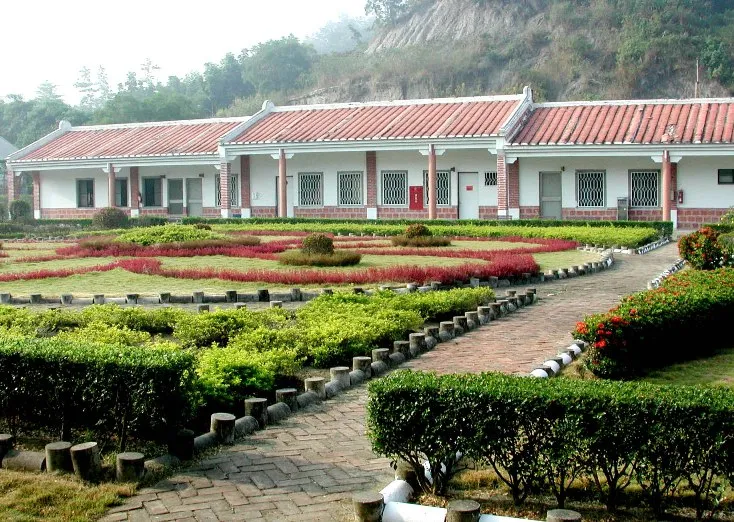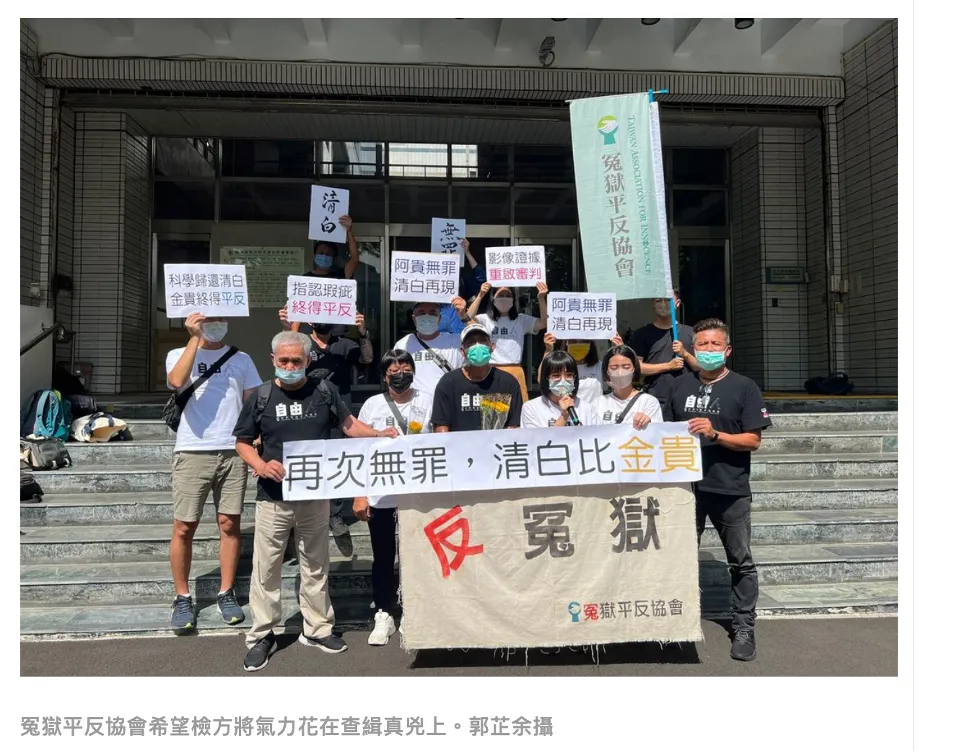"It takes guts not to execute someone" On sensationalistic news, violent crime, and the death penalty in Taiwan.
Hello readers!
Apologies for being out of touch. We’ve been working on this piece since it broke two weeks ago, but the sensationalism of the news got us too depressed to write.
A recap: on August 22, two police officers near Tainan, a major city in southern Taiwan, stopped a man suspected of stealing a motorcycle. When confronted, the suspect resisted arrest, stabbed both officers multiple times, and stole one of their guns. Both officers died en route to the hospital. A nationwide manhunt ensued. Police initially issued an arrest warrant for a man named Chen, who turned himself in to prove his innocence. After a special task force honed in on a new suspect, Lin Hsin-wu, they surrounded and arrested him at four in the morning, several hundred kilometers north of where the killings took place.
Here’s what we know about Lin. In August 2020, he was sentenced to eight years for robbery. On account of good behavior, his sentence was reduced and he was transferred to Mingde, a fenceless minimum-security prison that operates more like a halfway house, preparing inmates for reintegration into society. Mingde’s work program allows inmates to work in society without a uniform, and lets family members and dependents visit and sometimes stay. Inmates are also allowed to leave the prison regularly to see their family. On August 13 of this year, Lin left to visit his mother. He was supposed to return to Mingde two days later, but never did.

After Lin’s arrest, the media conversation turned toward punishment. Angry commenters started flooding the Facebook page of the Taiwanese Alliance to End the Death Penalty (TAEDP), claiming that its advocacy has undermined the deterrent effect of capital punishment. “It’s groups like you,” one wrote, “who have created so many murderers in Taiwan!” Another much-liked comment read, “I’m going to pray hard that the next victim of a murder is a member of TAEDP.”
News anchor Catherine Chang (張雅琴), a staple of the media landscape—her Twitter profile boasts that she’s the “number one anchor in Taiwan,” and she hosts both a nightly cable program and a weekly international news show—also went on the offensive. On her August 24 broadcast, she falsely stated that TAEDP was drawing up a plan to spare Lin from the death penalty: reports had emerged that he was drunk during the altercation, and Chang claimed TAEDP was preparing a “temporary insanity” defense.

The following day, the older sister of one of the victims went to the Legislative Yuan, Taiwan’s equivalent of Congress, and gave a teary, emotional speech criticizing the penal system in general and the warden of Mingde in particular. But her closing line was directed at TAEDP: “And to the Taiwanese Alliance to End the Death Penalty: Go to the deepest realm of Hell!”
TAEDP responded in a statement that it doesn’t comment on current investigations, refuting Chang’s claims that it was preparing a defense for Lin and expressing deep sympathy for the victims and their families. This only riled Chang further; on Facebook, she attacked the organization once again, claiming that people who want to abolish the death penalty are a tiny minority in Taiwan and demanding that TAEDP reveal “the mastermind behind your organizations” and “your sources of funding.”
Other celebrities, such as the singer and actress Pai Bing-bing, whose daughter was murdered in an infamous kidnapping case in 1997, also called out TAEDP. “Their abolitionist ideals trample on innocent victims. Why can’t the abolitionist coalition sympathize with the lives of the brutally murdered and the innocent blood that flowed into the river? Why do they sympathize with and worry about criminals who have done so much evil?” Like Chang, Pai stated that the majority in Taiwan supports the death penalty. There was no way, she continued, organizations like TAEDP could operate without either foreign funding or the backing of a political mastermind.
*
The Lin case has dominated Taiwanese media with an emotional rawness, and frankly a nastiness, that we haven’t seen in a while. (The previous controversy involved a plagiarized master’s thesis; the commentary was much tamer.) This is understandable given the dramatic nature of the case: the shootout, violent struggle, and manhunt, captured almost entirely on the surveillance cameras on every corner in Taiwan, riveted the public; the heartrending outburst by a victim’s sister put a face to the grief and loss.
As in most high-profile incidents, this case also raises broader questions around crime and Taiwanese society. Police–civilian relations are much less fraught here than in the United States. Not all officers carry guns, and those who do tend to be reluctant to use them. A broad series of regulations prohibits police from using excessive force, and on the whole police obey them. But now some are calling for the law to be dismantled so police can use guns on people like Lin.
Lin’s case also exposes how divisive progressive prison reform is here. Prison conditions are notoriously bad: inmates have to purchase everything, down to chopsticks and soap. Because of its harsh drug laws, Taiwan also has an overcrowding problem; prison reform advocates estimate that around 60 percent of incarcerated people don’t have a bed, so they sleep on the floor. Taiwanese law stipulates that they get thirty to sixty minutes of exercise time each day, but overcrowding also means they sometimes get only five. The Mingde minimum-security prison, where Lin was housed, belongs to a system of prisons created to alleviate overcrowding, but also to model the reform goal of helping convicts reintegrate into society. (Inmates there run a chicken farm, cultivate mangoes, and operate a metal factory. Among the six other minimum-security prisons with similar programs, Wuling produces coffee and pastries, and Ping-tung produces organic vegetables and handmade soap.)
The recent news has brought further scrutiny of these reforms, prison management, and the inmate placement process. And, like any high-profile murder case, it has brought the public conversation back to the issue of the death penalty, which remains legal here. All of the thirty-eight people currently on death row have filed petitions to the Constitutional Court, and the Regulations for Executing the Death Penalty have barred the government from executing them. The last executions were in 2018 and 2020; in both, the defendants wanted to die and refused to file a constitutional claim in court. Pro–death penalty groups can use cases like this one to pressure Tsai Ing-wen’s administration to resume executions, and politicians can easily capitalize on the popularity of the death penalty. Both already have begun doing so.
*
The sensationalistic media coverage points to a contradiction in Taiwanese society. On the surface, Taiwan is known for its politeness and political subtlety. The game—for politicians especially, but also for businessmen, academics, teachers, and everyone else—is to be understated. Don’t reveal too many of your cards. In the workplace and at social gatherings, avoid sensitive topics like politics or China. The Tsai administration has been masterful at this game, making it difficult for people to accuse it of being provocative or ideological.
With violent crime, though, all bets are off. You can call the accused person a monster, an animal, a piece of trash, somebody who deserves to be mobbed and discarded and killed, and most voters won’t bat an eye. This is a textbook example of Durkheimian theory in action: punishment as a release valve for emotion. As sociologist David Garland puts it, it’s “an emotional reaction which flares up at the violation of deeply cherished social sentiments.”
The death penalty is overwhelmingly popular here, with approval estimated between 80 and 90 percent. Both major parties appear to support it; if they don’t, they’ll suffer enormous blowback. In 2010, Minister of Justice Wang Ching-feng, a devout Buddhist, had to resign after saying in a speech that she was in favor of eventual abolition and that she’d “rather go to hell” than execute someone. As legal scholar Kai Ping Su observed, what offended people was her unapologetic style; subsequent Justice Ministers have been careful not to state their position too forcefully. Chiu Tai-san, former Justice Minister and current Minister of the Mainland Affairs Council, has said it was his duty to enforce the death penalty. But when a member of the press contrasted him to another minister, who had stated, “It takes guts to execute someone," Chiu managed to sneak in a pithy reply: “It also takes guts not to execute someone.”
As for the attacks on TAEDP, accusations of “foreign influence” are wielded like a smoking gun: all those liberal Europeans who abolished the death penalty in their own countries, now trying to interfere with Taiwanese popular will! This is a revealing argument, reflective of a rearguard action: think about how segregationists in the U.S. labeled civil rights activists “outside agitators,” or how the Chinese government claimed pro-democracy forces in Hong Kong were fomented by foreigners. For the most part, people in Taiwan, thirsty for international recognition, tend to welcome people from other countries, especially the West. But moments of violent rupture like the current one allow a suppressed nativist thinking to surface.
One irony of the “foreign influence” argument is that some of the harshest penal approaches here are the product of foreign influence. Taiwan explicitly imported three-strikes laws from the U.S., and today multiple courts enforcing these statutes in have cited American precedent. As legal scholar Hsieh Yu-wei has written, the proposal to import California’s three-strikes law emerged in government documents as early as in 1999, when the Ministry of Justice cited it as a model. Women’s groups, heavily critical of the parole system, supported the importation for sex-related offenses. (They also lobbied, unsuccessfully, for a sex-offender registry.) Taiwan adopted the statute in 2005, openly doing so in the “spirit” of its U.S. counterpart, though the Taiwanese version eliminates the possibility of parole for repeat offenders who have served a sentence of five years. In 2015, six inmates in a Kaohsiung prison committed suicide, explicitly cited this law as their reason. According to Huimin Chen, CEO of Prison Watch Taiwan, “For those in prison, the most important factor is the opportunity to be released. This is their only hope.”
Three-strikes laws against repeat offenders may be the most glaring example of legislation exported from the U.S., but there are a number of others, among them laws about drug possession and trafficking, and prison-centered solutions to domestic violence and sexual offenses. Meanwhile, American social movements, particularly those that seek to expand education programs in prison and obtain lessened penalties for repeat offenders, have been slower to enter Taiwanese progressive communities. “We appear to have learned all of the bad things from American criminal justice,” Chen told us recently, “but few of the good parts.”
*

Meanwhile, the absence of even a shred of self-reckoning in the media is infuriating. Just last week, Lin Jingui, accused of killing a taxi driver in 2007 and convicted with a life sentence, was exonerated by a high court after an interminable sequence of appeals and retrials. (The case isn’t over; the prosecutor could still appeal.) In coverage of Jingui’s arrest and the subsequent commentary, almost no one has evoked the possibility of his innocence. Those who seek to exonerate him do so without much media support, in a Sisyphean legal battle. Jingui’s older sister, who was at his side the whole time, said the media had hounded her, calling her brother a killer. “I felt like I was serving a life sentence too,” she said.
It may be naïve to ask any organization, let alone the media, to own up to its fallibility. And perhaps our low expectations of journalists is part of the problem, especially in Taiwan. A journalist from The Reporter, a much-admired investigative news organization here, told us that journalists have a reputation for being trashy; it’s an uphill battle to persuade both traditional parents and their children that it’s a career path worth pursuing. Of course, the Taiwanese media is hardly unique in sensationalizing crime—our American readers know exactly what this looks like stateside. Still, in the U.S, police violence and prison violence at institutions such as Rikers have led to a reckoning that remains totally absent here.
Perhaps we’re dreaming, but how extraordinary would it be if media commentators actually asked questions that created robust and thoughtful public dialogue? These questions needn’t “take sides”; they could simply open us up to new ways of thinking. What would a fair trial look like? What best practices across the world have been shown to prevent people in prison from committing crime when they are released? Would family members seek more help and support if there were less shame surrounding crime? Does respect for victims automatically mean taking the harshest and most punitive possible stance toward perpetrators? Danielle Sered’s Until We Reckon, which Michelle reviewed back in 2020, takes on that last question directly. Research shows that pain doesn’t go away with a life sentence; we are “deeply socialized,” Sered writes, to believe that harsh punishment—imprisonment and the death penalty—is what victims want. But is it? And what alternatives would they choose if alternatives were available?
It’s telling that the media went after TAEDP but stayed mum about the many other NGOs that have worked to increase awareness of state violence, from prison conditions to police torture to wrongful convictions. These include the Association for Human Rights (TAHR), the Judicial Reform Foundation (JRF), Prison Watch Taiwan, and the Taiwan Innocence Project (TIP), which exonerated Jingui. TIP is an important player in this conversation because it provides common ground in a divided society. Even those who believe in harsh punishment support TIP’s work. As Kai Ping Su observes, a “strong public distrust of the criminal justice system, particularly the mistrust of the courts and its prosecutors” pervades Taiwanese society.
We mourn the two men who were killed and grieve for their families. But the question of how to do so with deep and genuine respect for the gravity and irrevocability of the act of killing continues to preoccupy us. Bringing Lin to justice is necessary: it expresses a moral message that killing violates the sacred, that life is life. But whether state-administered execution really is justice ought to be treated as an open question that deserves our most searching, careful consideration. And that dialogue is nearly unthinkable in today’s climate, where the manipulative message from media commentators like Chang is that punishment can heal us, that blood for blood will deliver us from evil and provide a cathartic closure to pain.
But punishing a murderer can’t bring a loved one back. And if we decline to consider the conditions that give rise to violence, there can only be more grief and more pain for other families down the line. This ceaseless cycle conveniently locates evil in a single person instead of acknowledging our failures as a community. “The strongest argument against the death penalty,” says Carol Steiker, one of the world’s leading scholars of capital punishment, is that it “works against the human capacities of empathy and compassion that are important for moral judgment and are essential for moral choice. If you have to harden yourself collectively, steel yourself to take the life of other people, over time a society will wear away at these human capacities.”
We’re especially grateful to Huimin Chen and Yimin Wang for generously sharing their time and insights with us.
This article was originally published on A Broad and Ample Road .


